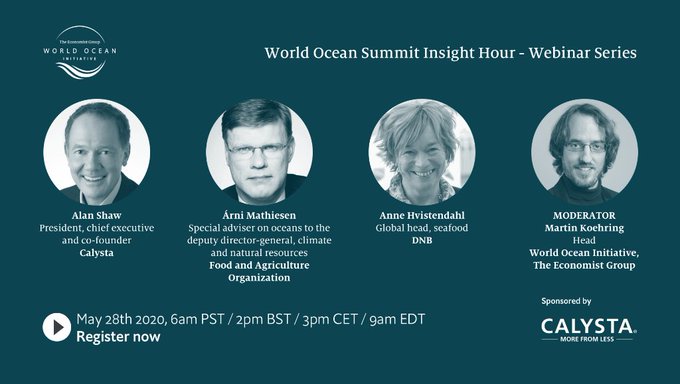Food security is one of the biggest concerns the world faces. Population growth to close to 10bn people by 2050 will lead to a protein gap that cannot be filled conventionally. Fish currently provide essential protein for around 1bn people. But the ocean could provide over six times more food than it does today, equal to more than two-thirds of the animal protein needed to feed the future global population, according to research commissioned by the High Level Panel for a Sustainable Ocean Economy.
However, global fisheries are under threat. According to the UN’s Food and Agriculture Organisation (FAO), around 60% of the world’s marine fish stocks are fully exploited and 33% overexploited. Fisheries subsidies are a major driver of overfishing and other destructive fishing practices, such as illegal, unreported and unregulated (IUU) fishing. Meanwhile, climate change is forcing fish species to shift geographically. The coronavirus pandemic is adding temporary disruption to the industry.
Countries have to do more to address overfishing through science-based catch limits. Headway on tackling IUU fishing and harmful subsidies will need to be accelerated. The potential of aquaculture to deliver sustainable seafood requires further attention. According to FAO, aquaculture could provide two-thirds of seafood for human consumption by 2030. But the aquaculture industry’s reliance on wild-caught fish for feed will come under intense scrutiny.
Focus on seafood sustainability
On Thursday May 28th I moderated a fantastic panel discussion on the future of seafood. Key questions addressed were as follows:
- Will the seafood industry return to “business as usual” when pandemic-related restrictions ease?
- How can the world feed a growing population in a more sustainable way?
- How can progress on tackling overfishing, IUU fishing and subsidies be accelerated?
- What are the main challenges for sustainable aquaculture and how can they be overcome?
- How does the investment community assess the outlook for sustainable seafood?
Speakers included Alan Shaw, president, chief executive and co-founder, Calysta; Árni Mathiesen, special adviser on oceans to the deputy director-general, climate and natural resources, Food and Agriculture Organization; and Anne Hvistendahl, global head, seafood, DNB.
The full webinar recording is below:
A summary article on the webinar is here.
On World Oceans Day, June 8th, the next World Ocean Summit Insight Hour will discuss the question If you could invest US$1bn in one ocean solution, what would it be and why?
The World Ocean Summit is scheduled to take place in Lisbon on March 2nd-4th 2021.
More posts on the ocean economy:
- Moderating a keynote and panel discussion at Oceanology International
- Moderating several sessions at the World Ocean Summit in Montréal
- Ocean Observation is Financial Infrastructure
- Blue Finance for Urban Coastal Resilience: From Narrative to Structure
- Speaking about blue financing for urban coastal resilience at Mumbai Climate Week

